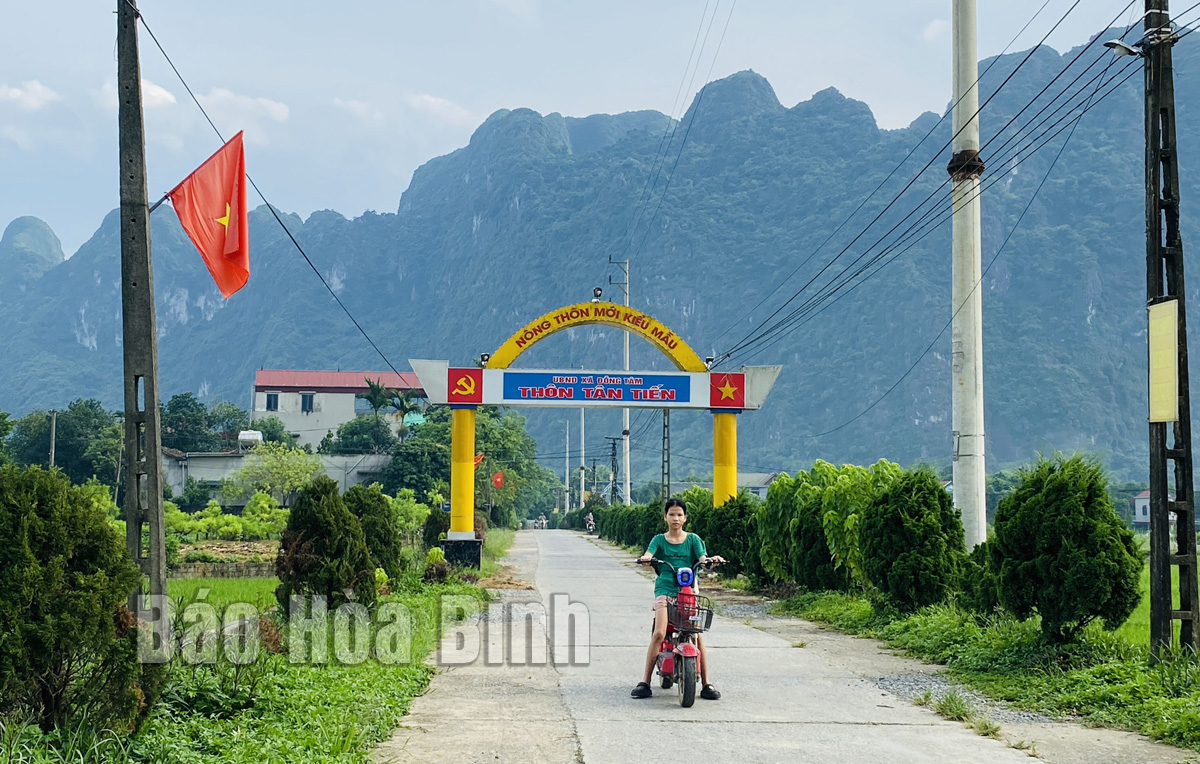
Dong Tam, the first commune of Lac Thuy district to complete the new-style rural area building programme, has focused on completing criteria for advanced and model new-style rural areas at the same time with the hope of achieving the status by the end of this year.
Local people of Tan Tien village in Dong Tam commune of Lac Thuy district join hands in building a model new-style rural area, creating a green, clean and beautiful landscape.
Tan Tien was recognised as a model new-style rural area in 2020 thanks to the consensus, joint efforts and contributions in finance and working days by local residents.
To date, the locality has had 6km roads with a lighting system and 3km with flowers planted along the two sides. The annual per capita income of local residents has reached 67 million VND (2,649 USD), with only three poor households. The rate of local people joining health insurance has reached 84.3%, while the rate of trained labourers has hit 65%.
Over the years, the local administration has promoted the dissemination of information about the building of advanced and model new-style rural areas through various methods, while honouring outstanding people in the work, thus raising public awareness of the significance of the programme and their roles and responsibilities.
In order to create more internal strengths in the work, the locality has promoted the shifting of the structure of crops and livestock, applying technological advances in production, forming production chains and models of clean, safe and organic agriculture. Currently, the commune has four 3-star OCOP products.
Nguyen Duc Han, Vice Chairman of the Dong Tam People’s Committee, said that to date, the locality has completed one out of the four criteria for a model new-style rural area.
In the coming time, the commune aims to strengthen communications to promote the role of local residents in the building of model and advanced new-style rural areas, while continuing to mobilise resources to complete the remaining criteria, and upgrading its rural infrastructure system in a synchronous and modern direction.
At the same time, it will encourage local people to change their economic structure, forming some production chain models and attracting high-tech agriculture projects, thus optimising the potential and advantages of the locality for economic development, said Han.
The Standing Board of the Hoa Binh provincial Party Committee has agreed in principle on a proposal by the Standing Board of the Party Committee of Hoa Binh city to gather feedback on the city’s 1:2000 zoning plan, which forms part of its broader urban development strategy.
Hoa Binh province has made notable progress in public administration reform and digital government development, with the satisfaction index among citizens and businesses reaching over 84%, according to recent government evaluations.
Thanks to great efforts by local authorities in recent times, the governance and public administration performance of Mai Chau district has been significantly improved.
In the afternoon of June 6, the Party Committee, the People's Council, the People's Committee and the Fatherland Front of Lac Son district solemnly held a meeting to celebrate the 139th anniversary of the district's founding (1886–2025) and the 79th anniversary of the establishment of the district's Party Committee (1946–2025). There was the attendance of Mr. Bui Van Thang, the Vice Chairman of the Provincial People's Council; Mr. Quach Tat Liem, the Vice Chairman of the Provincial People's Committee; Ms. Dang Bich Ngoc, the Deputy Head of the National Assembly Delegation of the province; as well as the former leaders of the province and district through various periods, who are the natives of the district.
Implementing the Politburo’s Resolution No. 57-NQ/TW on breakthroughs in science – technology, innovation, and digital transformation is a golden opportunity for the northern mountainous province of Hoa Binh to renew growth model, improve competitive edge and shorten digital gap.
Resolution 57-NQ/TW, issued by the Politburo on December 22, 2024, identifies sci-tech, innovation, and digital transformation as strategic breakthroughs to build a developed and prosperous nation. In Hoa Binh province, this spirit is not just a slogan, it’s being put into action through concrete initiatives that form a "new development triangle”: digital citizenship, digital economy, and digital administration.



